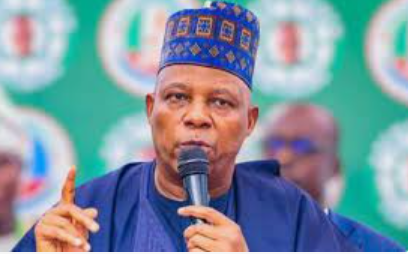
The government’s dedication to agricultural enhancements and the advancement of soil management practices continues to be reinforced by Vice President Kashim Shettima.
During the launch event of the innovative agricultural initiative ‘Soil Values’ in Nigeria, Shettima reiterated this commitment, which took place in Abuja on a Tuesday.
Projections from the Food and Agriculture Organization in 2023 indicated that approximately 26.5 million Nigerians might encounter a food crisis between the months of June and August 2024.
Highlighting areas at a pronounced risk, the organization pinpointed states like Borno, Sokoto, Zamfara, and the Federal Capital Territory.
The cause of food insecurity, as stated by FAO country representative Dominique Kouacou, is attributed to factors such as persistent insecurity stemming from insurgency, banditry, conflicts related to natural resources, and elevated costs of food and agricultural inputs due to inflation.
With support from the Dutch Directorate-General for International Cooperation and led by the International Fertilizer Development Centre, Soil Values seeks to rectify soil fertility concerns, promote sustainable agricultural development over the coming decade, and enhance the lives of 1.5 million small-scale food producers.
Emphasizing Nigeria’s struggles with soil degradation and nutrient depletion, Shettima underscored agriculture’s pivotal role in the national economy, contributing about 24% to the GDP. He stressed the pressing need to address challenges like land degradation, erosion, and drought, notably in the Sahel region.
In representation of the Vice President, his senior special adviser on Agribusiness and Productivity, Kingsley Uzoma, conveyed that “Agriculture stands as a cornerstone of Nigeria’s economy, significantly contributing to our national GDP. However, it is faced with multiple hindrances that impede its progress.
“Challenges such as land degradation, erosion, and drought are exacerbated due to overexploitation, deforestation, and overgrazing, particularly in the northern regions.”
Expressing Nigeria’s unwavering backing for the Soil Values program, the Vice President stressed its potential to empower farmers and revolutionize agricultural techniques within the region.
He urged other participating countries to collaborate efficiently in executing the initiative.
“Nigeria is proud to be part of this program, which will undoubtedly benefit our farmers, as well as farmers in other participating countries who have grappled with soil fertility issues for years.
“Our commitment to supporting the effective and sustainable implementation of the program in Nigeria is unwavering. We also encourage all participating nations to establish various mechanisms to facilitate the execution of Soil Values program activities,” noted Shettima.
Highlighting the significance of long-term investments in soil health, IFDC’s Chief Executive Officer Henk Duijn called upon governments and donors to prioritize funding initiatives with sustainable outcomes.
Duijn emphasized the collaborative approach of Soil Values, aiming to partner with regional and national institutions to amplify impacts and enhance implementation efficiency.
“Given the current scenario of soil degradation in the Sahel, investments in soil health will require substantial time to yield visible and tangible results. Governments and donors must allocate funding prioritizing soil health initiatives that promise long-term benefits.
“Soil Values have adopted an approach that avoids operating in isolation or imposing activities on Sahelian countries. Instead, it seeks collaboration with major institutional investors at the regional level, such as the World Bank and other development banks, and through national programs with local institutions.
“This will create significant leverage in collectively strengthening the implementation capabilities of local and international institutions, maximizing the impact of investments made.”
Encouraging stakeholders to embrace innovative interventions to combat diminishing soil fertility, Minister of Agriculture and Food Security Abubakar Kyari stressed Nigeria’s readiness to cooperate with international partners in implementing the Soil Values program.
Speaking through Bello Mohammed, Director of the Department of Agricultural Land & Climate Change Management Services, Kyari affirmed, “Nigeria extends a hand in collaboration with international partners. We are dedicated to implementing the Soil Values program, and stakeholders should adopt these novel interventions to tackle the challenges related to poor soil fertility.”
